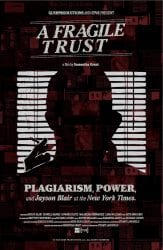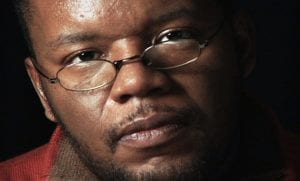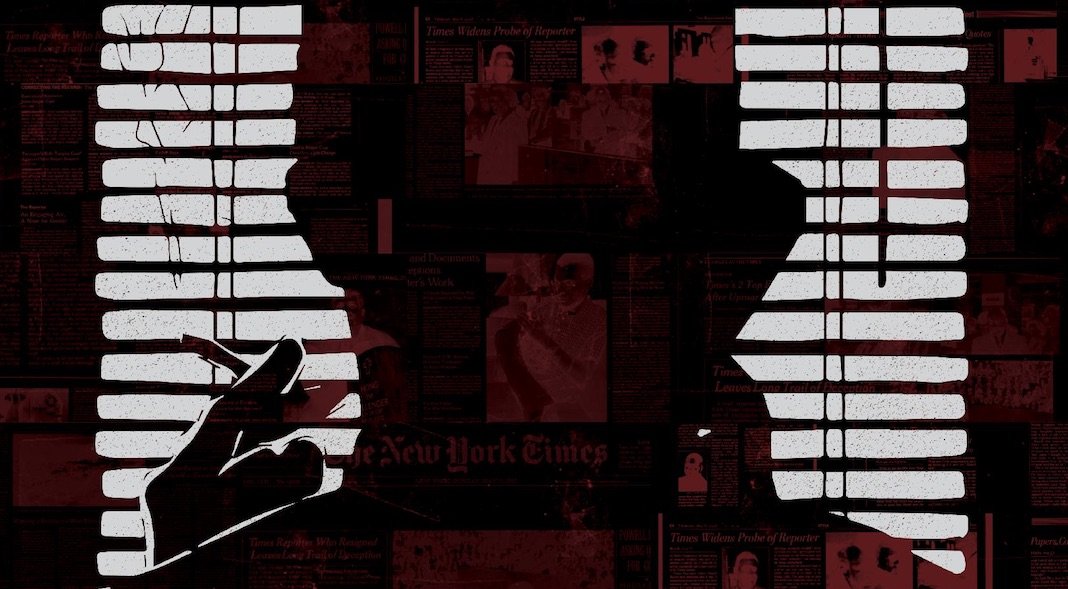Review: A Fragile Trust
There’s not much left that can be said about the Jayson Blair scandal.
- The New York Times, the paper where Blair worked, spent more than 7,000 words on it in the immediate aftermath.
- Jayson Blair wrote a critically and commercially-panned book on it.
- Seth Mnookin wrote a much better book on it.
- Countless news stories have covered it.
- Journalism textbooks use it as a case study.
- And I have written half a dozen articles about it and referenced it countless times.
Fourteen years after Blair’s dismissal. There doesn’t seem to be a lot left to say. Journalism’s most infamous plagiarist (at least until Jonah Lehrer) has revealed all of the secrets that he is going to.
But I held out hope that there was a little bit more as I had heard about a new documentary by Samantha Grant entitled A Fragile Trust: Plagiarism, Power, and Jayson Blair at the New York Times.
Making its premiere in 2013, 10 years after the scandal, I had held out hopes that the film could shine new light on Jayson Blair story.
Unfortunately, that didn’t quite come to pass. Instead, what I got was an excellent retelling of the story with little new insight.
However, that’s not the fault of the film, it’s the fault of Jayson Blair.
Trying to See This Film
 Normally, I wouldn’t dedicate a section in a review to my efforts to see a film but it’s been a pretty long road to watch this movie, one that lasted nearly four years.
Normally, I wouldn’t dedicate a section in a review to my efforts to see a film but it’s been a pretty long road to watch this movie, one that lasted nearly four years.
I first heard about it shortly after its release in June 2013. I watched eagerly to see if there was going to be a screening in my area (Note: Use caution when visiting the site as it appears to have been hacked and filled with spam keywords) but none was held. The closest the film came to New Orleans was Houston and I was tempted to make the drive.
In May 2014, the film was played on PBS as part of the Independent Lens series. Unfortunately, I didn’t hear about it until after it aired and the episode never made it to any streaming service (even with a paid PBS subscription).
In June 2014 things started looking up. Samantha Grant, the filmmaker behind the movie, was giving a keynote talk at the International Plagiarism Conference (where I was speaking). She gave an excellent talk, showed five short clips from the film and I took the opportunity to speak with her afterward and express my interest in the film.
However, at that time, she was still booking screenings for that film and, though I asked for a review copy, it just didn’t happen. Even after I reached out following the conference. I was told to be patient as the film would likely be in Netflix soon, a deal that apparently hasn’t happened yet.
Sometime around then (the exact month is unclear), Bullfrog Films acquired the distribution rights to the movie, but that distribution was still geared toward hosting screenings. I could purchase a DVD of the film, but it would cost me $280, $80 if I just wanted to rent it.
The price too high I just waited. And waited. It seemed that nothing would happen with this film.
The website for the film fell into disrepair. It seems to have been hacked (with pharmaceutical spam added in) and I warned Samantha about the issue in 2015.
@samanthagrant Heads up. Your main site appears to have been hacked.
— Jonathan Bailey (@plagiarismtoday) April 1, 2015
And again in 2016 I reached out again to see if there was a way to stream the film plus to let her know about another error on the site.
@samanthagrant Heads up. Your site for A Fragile Trust is not working. Also, is there a way to rent or stream the film at this time?
— Jonathan Bailey (@plagiarismtoday) November 22, 2016
I heard nothing back.
This pattern remained. Every so often I’d get curious and check the various services and see if it was available.
However, the last time I checked, something had indeed changed. The film was now available for purchase on Amazon and iTunes (will be available for rental on June 1st, 2017). Eagerly, I snapped up a copy and sat down to fulfill what had been a four-year mission to see this movie.
But was it worth the wait? It really depends on what you’re seeking from it.
Reviewing the Film
 I won’t recap the entirety of the Jayson Blair scandal, you can read that in my 2013 article for the 10-year anniversary. However, it’s suffice to say that Jayson Blair was a young, up and coming reporter at the New York times who was caught plagiarizing and fabricating many of his articles. The fallout resulted two top editors at the paper resigning and Blair himself leaving the industry in disgrace.
I won’t recap the entirety of the Jayson Blair scandal, you can read that in my 2013 article for the 10-year anniversary. However, it’s suffice to say that Jayson Blair was a young, up and coming reporter at the New York times who was caught plagiarizing and fabricating many of his articles. The fallout resulted two top editors at the paper resigning and Blair himself leaving the industry in disgrace.
A Fragile Trust is a documentary about that scandal. It features interviews with Jayson Blair, his friends, editors and the reporter who first noticed his plagiarism. Through those interviews and news clips from the time, the movie aims to tell the story of Jayson Blair from the eyes of those who lived the scandal.
To that end, it’s a slick, well-made documentary.At 75 minutes in length, it covers the scandal very from the hiring of Blair all the way through the downfall and aftermath. It also does a very good job putting the scandal into context, discussing the pressures of a post-9/11 newsroom that was making the transition from print to digital.
But as well-made as the film is, it offers sadly little in the way of brand-new insight. The reason isn’t because Grant and others working on the film, it’s because Blair is outright uncooperative.
At the International Plagiarism Conference, Grant explained that Blair did not sit for all of the interviews he had scheduled and was cagey throughout. That cageyness shows as Blair winds up giving the same (debunked) explanations as if he were an aging musician trotting out his greatest hits to win over the crowd.
The truth is that Blair didn’t plagiarize because of post-9/11 pressure, drug/alcohol abuse, sudden mental illness or the environment of the New York Times. He was plagiarizing was far back as when he worked at his college newspaper.
But if you’re expecting self-reflection from Blair or maybe a more honest take on the reasons, this isn’t the film it happens in.
If you’ve studied this case, read Blair’s book and read the accounting by the New York Times. There’s not much new in this film other than some context.
While that context is interesting and useful, it’s not what I was hoping for, even if what I was hoping for was completely unrealistic.
Bottom Line
I’m very glad that this film was made and I’m especially glad that it’s now been released to the public. This is a very important film for journalism and journalism ethics.
While I’m sad it took so long to get a wide release, I’m glad it’s here now.
However, if you understand and know the story of Jayson Blair well, don’t expect a great deal new. Blair has nothing new he wants to say and, while the other interviews are also great and many are very insightful, Blair is the one that holds the most crucial details and he’s not talking.
So I don’t recommend this film to someone, like myself, looking for new insight into the story. However, for those unfamiliar with Blair and the saga surrounding him, it’s a well-paced and balanced documentary that tells the story very capably.
It’s far more accurate than Blair’s book (far more ethical to purchase too) and is a great way to introduce new journalism students to the story.
But, if you’re a regular reader of this site, you’re likely already very familiar with Blair and this movie doesn’t have a lot to teach. It’s best used as an approachable introduction to Blair’s story, rather than a retelling that adds to the narrative.
Sadly, this film was probably Blair’s last chance to really explain things and really lay himself bare. He didn’t do it and it’s unlikely that anyone else will even bother to try in the future.
The only hope I have on this front is an article I ran across while researching this one. According to Isabella Kwai at Duke Reporters’ Lab, Blair gave a talk to students at the university where he emphasized that it was character flaws, not mental illness or the pressures he faced, that caused his plagiarism.
That’s a good start, but there’s still plenty left for Blair to say. Unfortunately though, he’s not saying it in this film.
Want to Reuse or Republish this Content?
If you want to feature this article in your site, classroom or elsewhere, just let us know! We usually grant permission within 24 hours.
